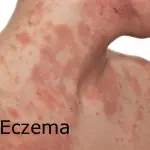Eczema Causes and Treatments
While eczema only affects about 4% of the population, it’s common enough that we all probably know someone suffering from it. We see a friend’s child, or someone at the market, with red patches on their skin. Naturally we’re curious and sympathetic. But what if you’re the one with the rashes and patches? What then?
Sadly, without a lot of common knowledge about eczema, many people suffering are looked upon as contagious. Others may be scared to touch or hug them. What makes this even worse is that mostly children are affected and must deal with the physical suffering as well as the social and emotional. In fact, the percentage of sufferers goes up to 10% – 15% if you only count children. If we all try to learn a little more about eczema, and share what we know with others, our friends and family will have the emotional support they need to help deal with this chronic disease.
First off, what is eczema, really? Eczema is a broad term that applies to many persistent skin conditions. It’s an autoimmune disease that presents itself by inflammation of the skin. Typically eczema is red, scaly, itchy patches on the skin. If the condition is severe, it could even cause water blisters to appear.
Although we do not know what causes eczema, it being an autoimmune disease we know that it affects our immune system. Because it deals so closely with our immune system, the risk of any type of infection is increased for those suffering.
Eczema is a child’s disease and can appear even on infants. It’s a chronic condition but is something that clears up and flares up so adults aren’t burdened with it quite as often as children are. Temperature and even food can play a factor in when flare ups occur.
There are many things those with eczema can do for relief. Bathing daily can help. Try to avoid using soaps or detergents directly on the affected skin since this can strip the skin of its natural oils only further drying it out. Moisturizers used at lease once a day is recommended. Oily based lotions have shown to have better results than water based ones.
Jessica Neal, one of our great Nurse Practitioners, explains more about what eczema really is.
Eczema can be difficult to diagnose because so many things, such as allergies, can cause skin rashes and irritations. Contact our office for an appointment if any of these symptoms sound like you. If not, but you know someone suffering, take them a bottle of moisturizer as a gift and be sure to give them a hug.
















